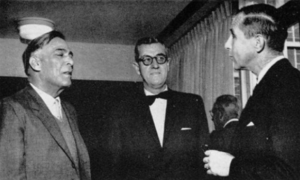Theodore Woodward
Theodore E. Woodward | |
|---|---|
 | |
| Born | March 22, 1914 Westminster, Maryland, U.S. |
| Died | July 11, 2005 (aged 91) Baltimore, Maryland, U.S. |
| Alma mater | Franklin & Marshall College University of Maryland School of Medicine |
| Occupation | Medical Researcher |
| Spouse |
Celeste Lauve Woodward
(m. 1938–2005) |
| Children | 3 |
| Awards | Louis Pasteur Medal (1961) |
Theodore Englar Woodward[1] (March 22, 1914 – July 11, 2005) was an American medical researcher at the University of Maryland, Baltimore. In 1948, he received a Nobel Prize nomination for his role in finding cures for typhus and typhoid fever.[citation needed]
Biography
[edit]Born in Westminster, Maryland the son of Lewis K. Woodward, Sr. and grandson of Lewis Woodward, Theodore E. Woodward is the patriarch of one of Maryland's large medical families, consisting of his wife, Celeste L. Woodward, his sons, William E. Woodward and R. Craig Woodward, and his daughter, Celeste L. Woodward.[citation needed] After his early education at the West End School and the Westminster Elementary and High School, he attended Franklin and Marshall College where he graduated in 1934.[2] He received his medical degree from the University of Maryland School of Medicine in 1938.
After a two-year rotating internship at the University of Maryland Hospital, he trained in internal medicine and gastroenterology at the Henry Ford Hospital in Detroit, all in preparation to enter practice in Carroll County, Maryland.
Woodward entered the service of the United States Army in January 1941, just prior to the outbreak of World War II. During the ensuing five years, he served in various medical units and with the United States Typhus Fever Commission with assignments in North Africa, Italy, England, France, New Guinea and offshore islands, and the Philippine Islands.
Woodward authored the history of the U.S. Armed Forces Epidemiological Board and Commissions, which fostered the development of many advances in military medicine, with lasting benefits for civilian public health and disease prevention.[3]
Following discharge from military service in June 1946, Woodward entered private practice. In 1948, he was appointed as a full-time Associate Professor of Medicine at the University of Maryland School of Medicine. In June 1954, he was appointed to the Chair of Medicine, a position which he held until 1981, at the time of his retirement. Woodward died in Baltimore aged 91.
Woodward is credited having the "best claim" to coining, in the late 1940s, the medical zebra aphorism (following the principle of Occam's razor) paraphrased variously as:
- "When you hear hoofbeats, think horses, not zebras."
and
- "When you hear hoofbeats behind you, don't expect to see a zebra."[4]
See also
[edit]- University of Maryland School of Medicine
- University of Maryland, Baltimore, professor for nearly a half-century at the University of Maryland School of Medicine
- Infectious Diseases Society of America, a charter member of the IDSA and president in 1976
- Infectious Disease, "He was one of the real founding fathers of the discipline of infectious diseases" -William L. Henrich
- Walter Reed Tropical Medicine Course, former faculty and recipient of "The Colonel George W. Hunter III Certificate"
References
[edit]- ^ Commencement Exercises (PDF). University of Maryland. June 4, 1938. p. 5. Retrieved 2021-01-31.
- ^ Press release Archived 2004-08-28 at the Wayback Machine
- ^ ISBN 9994677330, ISBN 978-9994677337, https://www.amazon.com/Armed-Forces-Epidemiological-Board-Commissions/dp/9994677330
- ^ "When You Hear Hoofbeats Look for Horses Not Zebras – Quote Investigator". 26 November 2017. Retrieved 2022-10-27.
External links
[edit]- Medical Alumni Association mini-biography
- Press release announces Woodward as the 2001 Alumni Citation award recipient from Franklin & Marshall College.
- Mackowiak PA (2006). "Theodore E. Woodward: 1914–2005". Trans. Am. Clin. Climatol. Assoc. 117. American Clinical and Climatological Association: lxviii–lxxi. PMC 1500927. PMID 18528458.
- Mackowiak PA (July 2007). "Theodore E. Woodward: 1914–2005". Clin. Infect. Dis. 45 (Suppl 1): S3–5. doi:10.1086/518134. PMID 17582566.
- Washington Post Obituary
- 1914 births
- 2005 deaths
- People from Westminster, Maryland
- Franklin & Marshall College alumni
- University of Maryland, Baltimore alumni
- United States Army Medical Corps officers
- United States Army personnel of World War II
- American medical researchers
- University of Maryland School of Medicine faculty
- Members of the National Academy of Medicine
